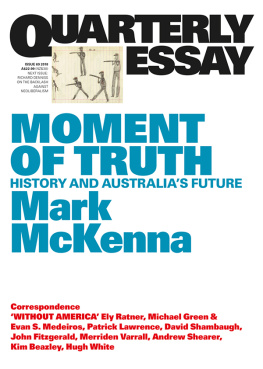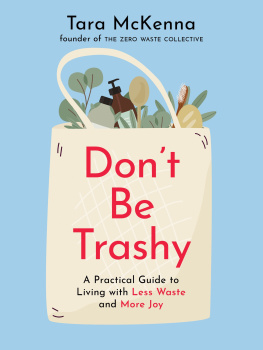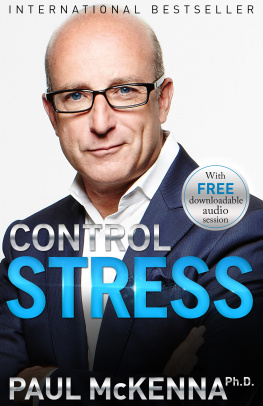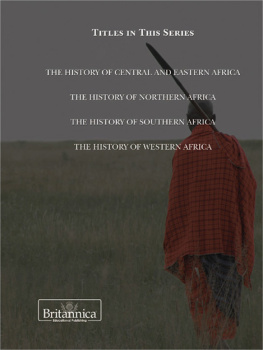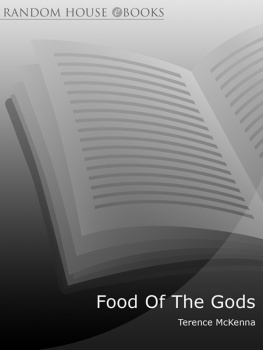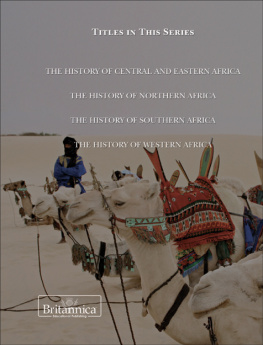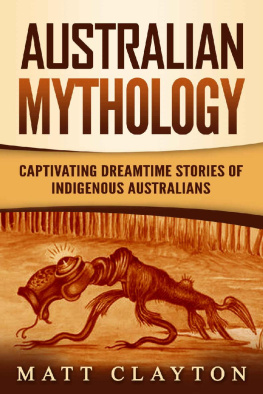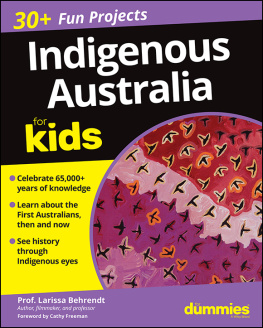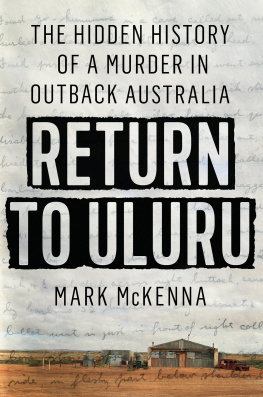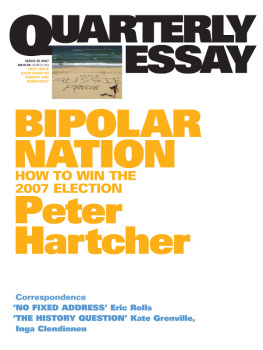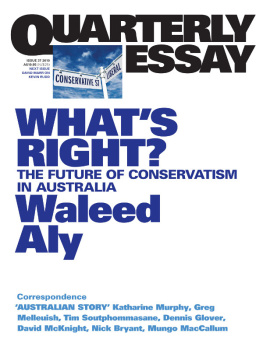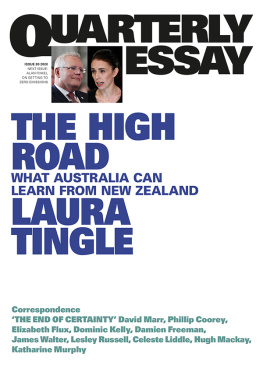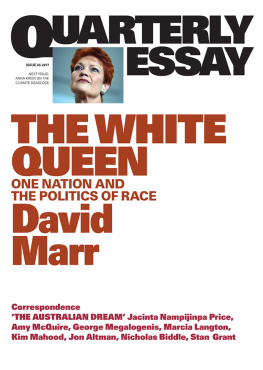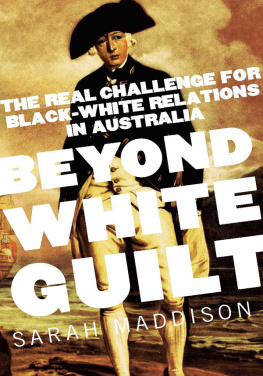Quarterly Essay
Quarterly Essay is published four times a year by Black Inc., an imprint of Schwartz Publishing Pty Ltd. Publisher: Morry Schwartz.
ISBN 9781743820377 ISSN 1832-0953
ALL RIGHTS RESERVED.
No part of this publication may be reproduced, stored in a retrieval system, or transmitted in any form by any means electronic, mechanical, photocopying, recording or otherwise without the prior consent of the publishers.
Essay & correspondence retained by the authors.
Subscriptions 1 year print & digital (4 issues): $79.95 within Australia incl. GST. Outside Australia $119.95. 2 years print & digital (8 issues): $149.95 within Australia incl. GST. 1 year digital only: $49.95.
Payment may be made by Mastercard or Visa, or by cheque made out to Schwartz Publishing. Payment includes postage and handling.
To subscribe, fill out and post the subscription card or form inside this issue, or subscribe online:
www.quarterlyessay.com
Phone: 61 3 9486 0288
Correspondence should be addressed to:
The Editor, Quarterly Essay
Level 1, 221 Drummond Street
Carlton VIC 3053 Australia
Phone: 61 3 9486 0288 / Fax: 61 3 9011 6106
Email:
Editor: Chris Feik. Management: Caitlin Yates. Publicity: Anna Lensky. Design: Guy Mirabella. Assistant Editor: Kirstie Innes- Will. Production Coordinator: Hanako Smith. Typesetting: Tristan Main.
In memory of Gatjil Djerrkura (19492004)
and Inga Clendinnen (19342016)
There remains a scar on the face of the country, a birthstain of injustice and exclusion directed against that people who could so easily provide the core of our sense of ourselves as a nation, but who remain on the fringes of the land they once possessed.
Inga Clendinnen, 1999
What Aboriginal people ask is that the modern world now makes the sacrifices necessary to give us a real future. To relax its grip on us. To let us breathe, to let us be free of the determined control exerted on us to make us like you Let us be who we are Aboriginal people in a modern world and be proud of us. Acknowledge that we have survived the worst that the past has thrown at us, and we are here with our songs, our ceremonies, our land, our language and our people our full identity. What a gift this is that we can give you, if you choose to accept us in a meaningful way.
Galarrwuy Yunupingu, 2016
ULURU STATEMENT FROM THE HEART
We, gathered at the 2017 National Constitutional Convention, coming from all points of the southern sky, make this statement from the heart:
Our Aboriginal and Torres Strait Islander tribes were the first sovereign Nations of the Australian continent and its adjacent islands, and possessed it under our own laws and customs. This our ancestors did, according to the reckoning of our culture, from the Creation, according to the common law from time immemorial, and according to science more than 60,000 years ago.
This sovereignty is a spiritual notion: the ancestral tie between the land, or mother nature, and the Aboriginal and Torres Strait Islander peoples who were born therefrom, remain attached thereto, and must one day return thither to be united with our ancestors. This link is the basis of the ownership of the soil, or better, of sovereignty. It has never been ceded or extinguished, and co-exists with the sovereignty of the Crown.
How could it be otherwise? That peoples possessed a land for sixty millennia and this sacred link disappears from world history in merely the last two hundred years?
With substantive constitutional change and structural reform, we believe this ancient sovereignty can shine through as a fuller expression of Australias nationhood.
Proportionally, we are the most incarcerated people on the planet. We are not an innately criminal people. Our children are aliened from their families at unprecedented rates. This cannot be because we have no love for them. And our youth languish in detention in obscene numbers. They should be our hope for the future. These dimensions of our crisis tell plainly the structural nature of our problem. This is the torment of our powerlessness.
We seek constitutional reforms to empower our people and take a rightful place in our own country. When we have power over our destiny our children will flourish. They will walk in two worlds and their culture will be a gift to their country.
We call for the establishment of a First Nations Voice enshrined in the Constitution.
Makarrata is the culmination of our agenda: the coming together after a struggle. It captures our aspirations for a fair and truthful relationship with the people of Australia and a better future for our children based on justice and self-determination.
We seek a Makarrata Commission to supervise a process of agreement-making between governments and First Nations and truth-telling about our history.
In 1967 we were counted, in 2017 we seek to be heard. We leave base camp and start our trek across this vast country. We invite you to walk with us in a movement of the Australian people for a better future.
26 May 2017
MOMENT OF TRUTH | History and Australias Future |
Mark McKenna |
Walk across the vast open spaces of Canberras Parliamentary Triangle and there is more than enough room to reflect on Australias future. Nature has been ironed out. Its all grass and sky. Standing in the strip between the Tent Embassy and Lake Burley Griffin, the invented nature of the place hits you in the face. And the silence.
It is not only the absence of any acknowledgment of the countrys violent foundation that makes the silence palpable, but also 65,000 years of Indigenous occupation. If it were not for the Tent Embassy and the easily missed Reconciliation Place, Indigenous Australia would have no obvious presence within the Parliamentary Triangle. More than a century after federation, Australians still struggle to include Indigenous people in our vision of the nation.
Since the doors of Old Parliament House opened on 9 May 1927, Aboriginal people have beaten a path to Canberra to remind the Commonwealth that their rights and sovereignty have not been extinguished. First in a long line of petitioners were Jimmy Clements and John Noble, two Wiradjuri elders who walked over 150 kilometres from Tumut in southern New South Wales to attend the opening ceremony at Parliament House in the presence of the Duke and Duchess of York. When it came time for officials and dignitaries to be paraded before the royal couple, Clements insisted on his right to be presented. As Melbournes Argus reported, an ancient Aborigine, who calls himself King Billy and who claims sovereign rights to the Federal Territory, walked slowly forward alone, and saluted the Duke and Duchess. Clements was eighty years of age. One photograph of him taken that day shows a bearded man sitting in the dust, surrounded by his sleeping dogs, clutching an Australian flag. When he died three months later, a newspaper reported that he was buried in Queanbeyan cemetery, outside consecrated ground.
Clements walked to Canberra to claim his sovereign rights at the very moment the sovereignty of the Crown and the Australian parliament was asserted. One year later, on behalf of the Aborigines Progressive Association, Fred Maynard wrote to the Royal Commission on the Constitution of the Commonwealth to remind the nations leaders that the constitution and laws that governed the lives of Aborigines were an insult to the intelligence of our people. Since then, the line of petitioners is long, yet their names barely register in the memory of most non-Aboriginal Australians. They include the leaders of the 1967 referendum and the founders of the Tent Embassy, and the authors of both the 1988 Barunga Statement and, of course, the Uluru Statement from the Heart, transmitted from the countrys spiritual centre to its political centre all of them hoping, like the Yirrkala petitioners in 1963, that they would not be completely ignored by the Commonwealth government, as they have been ignored in the past.

